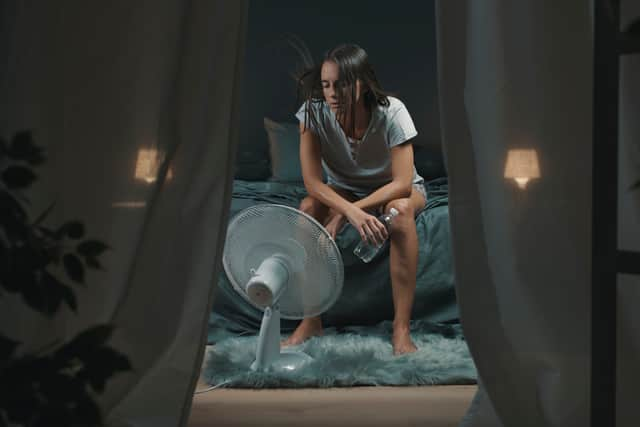Why do I sweat so much? Causes of excessive sweating and treatment options - explained by a pharmacist
and live on Freeview channel 276
Sweating is a normal bodily process, but is sweating a lot common and are there things you can do to stop it?
Here’s what you need to know.


Why do I sweat so much?
It’s normal to sweat if you get hot or do exercise, but you may be sweating excessively if you’re sweating when your body does not need to cool down.
Advertisement
Hide AdAdvertisement
Hide AdExcessive sweating can happen for no obvious reason, because of another condition you may have or as a side effect of a medicine you’re taking, the NHS said.
Generally, a person sweats 0.5-2 litres an hour during physical activity, but this can vary from person to person, according to Abbas Kanani, a pharmacist at Chemist Click.
However, people with the condition hyperhidrosis, which is where the body’s sweat glands are overactive, are prone to sweating more.
Primary hyperhidrosis is abnormal levels of sweating that’s not linked to heat or exercise and has no underlying medical cause, but secondary hyperhidrosis is due to an underlying condition such as fever, overactive thyroid, an infection, leukaemia and lymphoma.
Advertisement
Hide AdAdvertisement
Hide AdPeople with higher fitness levels and muscle mass also sweat more because their bodies produce more heat than fat.
Sweat glands can also change as we age making us less tolerant to heat and therefore producing more sweat.
“Larger people also generate more heat as they have to move a larger body mass, causing them to sweat more,” Mr Kanani added.
Excessive amounts of alcohol can also trigger blood vessels to dilate, which can then cause excess sweating.
Advertisement
Hide AdAdvertisement
Hide AdCaffeine is a stimulant which causes the body to warm and sweat more than normal, and certain prescription and non-prescription medications that alter blood sugar levels, such as Insulin, can also bring on excessive perspiration.
Hormonal fluctuations due to menopause, pregnancy and menstrual cycles cause progesterone levels to rise which increases metabolism and leads to a higher body temperature.
Is there anything that can be done if you sweat profusely?
There are short-term solutions for excessive sweating, including using a good quality antiperspirant which should help with controlling the odour from sweating.
You can also try to wear looser clothing which helps minimise signs of sweating and keeping the body cool.
Advertisement
Hide AdAdvertisement
Hide AdMr Kanani advises opting for moisture absorbing clothing and changing items throughout the day to keep yourself feeling fresh and dry.
You can also avoid spicy foods, caffeinated drinks and alcohol because these can all trigger sweating.
The NHS said you can see a pharmacist about excessive sweating. You can buy things without a prescription, such as:
- stronger antiperspirants instead of deodorant
- armpit or sweat shields to protect your clothing
- foot powders for sweaty feet
- soap substitutes that are more gentle on your skin
When should I see a GP?
You should see your GP if you’re sweating excessively and:
- things you can do yourself are not helping
- it’s lasted for at least 6 months
- it stops you from getting on with your daily activities
- it happens at least once a week
- it happens at night (you’re having night sweats)
- you have a family history of excessive sweating
- you’re taking medicine for another condition
The GP may refer you for tests if they think another condition may be causing your sweating.
Advertisement
Hide AdAdvertisement
Hide AdIf there’s no obvious cause for your sweating, and nothing seems to be helping, then you may be referred to a dermatologist.
They may recommend other treatments that you can try, such as:
- taking tablets that reduce sweating
- treating the areas with a weak electric current passed through water or on a wet pad (iontophoresis)
- having botox injections for sweating under the armpits (this may not be available on the NHS)
- surgery – for example, removal of the sweat glands
Comment Guidelines
National World encourages reader discussion on our stories. User feedback, insights and back-and-forth exchanges add a rich layer of context to reporting. Please review our Community Guidelines before commenting.
